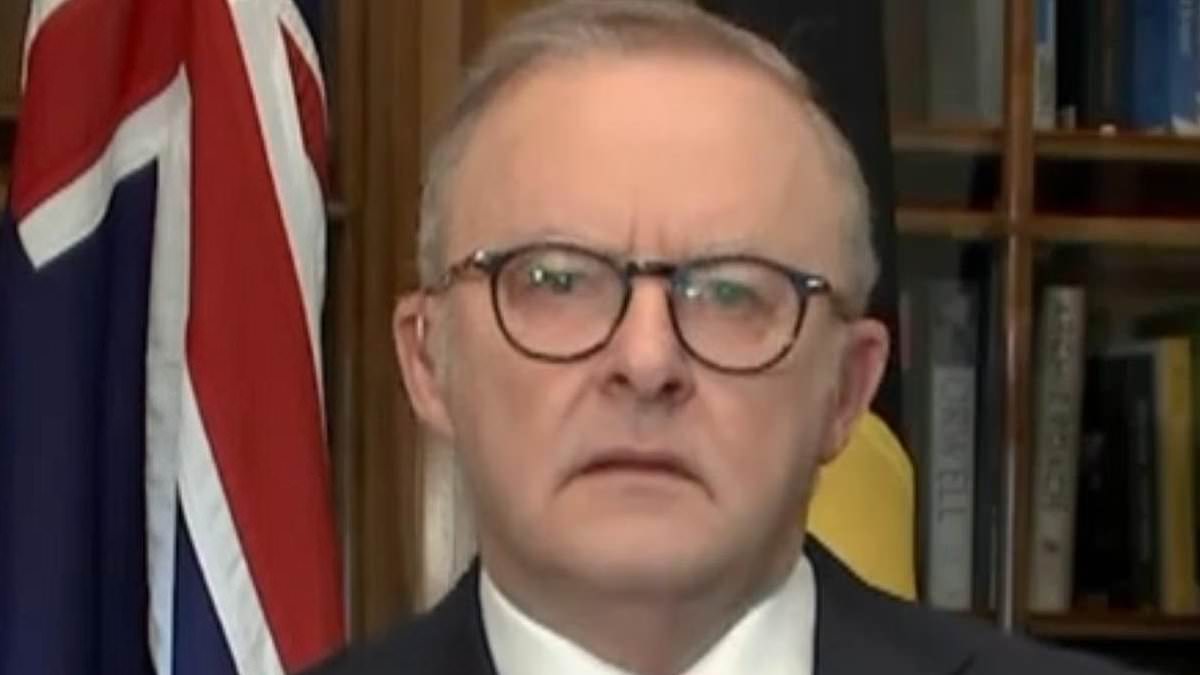Prime Minister Anthony Albanese has squirmed his way through an uncomfortable interview where he was told traditional Labor voters are losing faith in his government.
Sunrise host Nat Barr introduced the interview by talking about a conversation she had with the taxi driver who took her to the Channel Seven studios on Thursday morning.
‘He (the driver) said, ‘I have been a Labor voter my entire life, but for the first time I think I will vote differently at the next election’,’ Barr explained.
The cabbie told Barr things had become too expensive and he was having to work two jobs to make ends meet but didn’t think the government was doing anything about it.
Barr then introduced an uncomfortable looking Mr Albanese by stating: ‘This is your biggest problem: people like this cabbie are losing faith. How do you respond to that?’
‘Cost-of-living pressures are real, but that’s why we’ve engaged in responsible economic management to bring inflation down while delivering cost-of-living relief,’ the Prime Minister responded.
‘Yesterday’s figures show that headline inflation is down from 3.5 per cent to 2.7 per cent. That’s a good outcome.
‘There’s more work to be done, but we’ve managed to achieve this while also delivering a tax cut for that cabbie — who would have gotten nothing under the previous scheme.’
Mr Albanese kept listing his government’s actions while saying inflation had been trending down ‘even though it hasn’t been smooth’.
Barr looked unimpressed and attempted to correct Mr Albanese.
‘OK, but some would argue about the government’s spending, and the RBA has said that progress in reducing underlying inflation has slowed,’ she said.
‘So it’s not all heading in one direction like we need. Let’s go to negative gearing…’
Mr Albanese interrupted.
‘With respect Nat, those statements were before these latest figures came out,’ Mr Albanese said while laughing.
‘A day before,’ Barr replied sternly before giving a tight-lipped grin.
‘These figures came out yesterday,’ Mr Albanese tried to continue.
‘She (Ms Bullock) said that literally a day before,’ Barr insisted before Mr Albanese appeared to concede the point by saying ‘that’s right’.
Reserve Bank Governor Michele Bullock made it clear on Tuesday, when the central bank decided to hold the official cash rate 4.35 per cent, the bank’s board was firmly sticking to its target underlying inflation band of between two and three per cent.
She said the bank would look for ‘sustainable’ moves downward before cutting rates.
Ms Bullock also flagged that federal and state public spending was fueling inflation.
‘Relative to three months ago, GDP growth has been revised up in the year to mid-2025,’ it said.
‘The stronger outlook for public demand reflects ongoing spending and recent announcements by federal and state and territory governments.’
This appears to contradict Treasurer Jim Chalmers’ claim earlier this year that his budget was ‘helping to push inflation down in the near term, not up’.
‘The new forecast from the Reserve Bank is that the Reserve Bank’s near-term inflation forecasts are better, not worse,’ Dr Chalmers told the ABC.
‘ And that’s because of the design of our cost-of-living policies. In addition to our cost-of-living policies, the Governor has previously said our surpluses are helping as well.
‘And all of that means that inflation would be higher without our efforts in the budget.
‘Budget spending is not the primary determinant of prices in the economy, but we can be helpful and we are being helpful. With the design of our cost of living policies which help us get back to targets sooner.’
Meanwhile, Deloitte Access Economics partner Stephen Smith also warned government spending was keeping inflation higher for longer.
‘High government spending and migration are injecting demand into the economy, meaning the RBA’s hands are tied – the labour market is still too robust to permit them to follow the US Federal Reserve and deliver a rate cut at this time,’ he said.
In other signs of tension with the Labor government, Ms Bullock has previously suggested the $300 energy rebates would do little to address underlying inflation and expressed concerns about high immigration.
With reports the Albanese government has asked Treasury to model aspects of removing or limiting negative gearing Barr asked why the government was revisiting a policy that was credited with losing Bill Shorten the ‘unloseable’ 2018 election.
However, Mr Albanese dodged the question without providing a yes or no answer.
He said reforming negative gearing ‘won’t address the supply issue, which is the real problem,’ and expressed his ongoing frustration that Labor’s plan to build more housing was being blocked in the Senate
Barr asked if curbing negative gearing was a way to get more onside with the Greens, who are siding with the Coalition to block Labor’s housing measures.
‘No, I’m not interested in the Greens’ approach. They’re blockers, not builders. They don’t have a plan to actually achieve anything,’ Mr Albanese said.
‘You might have to work with them. What if you’re stuck in a minority government?’ Barr pressed.
‘There will be no coalition with the Greens,’ Mr Albanese stated.
‘I’m committed to governing in the Labor Party’s own right.’
Negative gearing policies allow property investors to claim tax deductions when the costs of owning and maintaining their investment properties, such as loan interest and maintenance expenses, exceed the rental income they earn from them.
This tax benefit can reduce the property investor’s taxable income and is used by investors to lower their tax bills.
